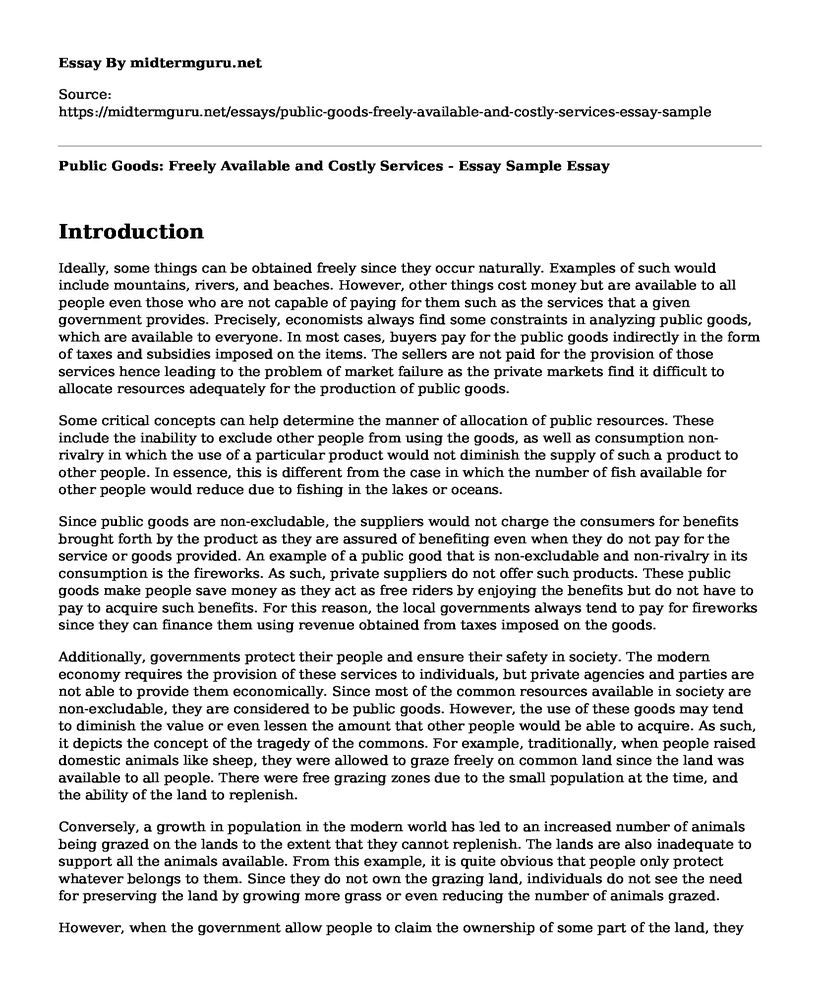Introduction
Ideally, some things can be obtained freely since they occur naturally. Examples of such would include mountains, rivers, and beaches. However, other things cost money but are available to all people even those who are not capable of paying for them such as the services that a given government provides. Precisely, economists always find some constraints in analyzing public goods, which are available to everyone. In most cases, buyers pay for the public goods indirectly in the form of taxes and subsidies imposed on the items. The sellers are not paid for the provision of those services hence leading to the problem of market failure as the private markets find it difficult to allocate resources adequately for the production of public goods.
Some critical concepts can help determine the manner of allocation of public resources. These include the inability to exclude other people from using the goods, as well as consumption non-rivalry in which the use of a particular product would not diminish the supply of such a product to other people. In essence, this is different from the case in which the number of fish available for other people would reduce due to fishing in the lakes or oceans.
Since public goods are non-excludable, the suppliers would not charge the consumers for benefits brought forth by the product as they are assured of benefiting even when they do not pay for the service or goods provided. An example of a public good that is non-excludable and non-rivalry in its consumption is the fireworks. As such, private suppliers do not offer such products. These public goods make people save money as they act as free riders by enjoying the benefits but do not have to pay to acquire such benefits. For this reason, the local governments always tend to pay for fireworks since they can finance them using revenue obtained from taxes imposed on the goods.
Additionally, governments protect their people and ensure their safety in society. The modern economy requires the provision of these services to individuals, but private agencies and parties are not able to provide them economically. Since most of the common resources available in society are non-excludable, they are considered to be public goods. However, the use of these goods may tend to diminish the value or even lessen the amount that other people would be able to acquire. As such, it depicts the concept of the tragedy of the commons. For example, traditionally, when people raised domestic animals like sheep, they were allowed to graze freely on common land since the land was available to all people. There were free grazing zones due to the small population at the time, and the ability of the land to replenish.
Conversely, a growth in population in the modern world has led to an increased number of animals being grazed on the lands to the extent that they cannot replenish. The lands are also inadequate to support all the animals available. From this example, it is quite obvious that people only protect whatever belongs to them. Since they do not own the grazing land, individuals do not see the need for preserving the land by growing more grass or even reducing the number of animals grazed.
However, when the government allow people to claim the ownership of some part of the land, they tend to realize the significance of maintaining it and ensuring the exclusion of its use by other people. Another problem around the globe that comes about due to the tragedy of the commons is evident in the use of huge nets to harvest fish. Large ships and boats are used to catch fish thereby leading to the rapid depletion of fish and fishing stock. Due to the rate of depletion, it is more likely that it will reach a point where the fish will not be able to repopulate as pressure continues for the fishing stock.
Governments fear for the adverse outcomes that such activities would cause to the society hence making them impose some policies such as restrictions on the fish size, which one is allowed to catch. This can be ensured when the hole sizes of fishing nets are regulated. The governments also restrict fishing to particular seasons to allow the breeding of fish species and protect the grounds where they breed.
Precisely, a government might use a range of techniques to ensure that its people acquire public goods, which they might require. Also, governments can incorporate effective policies to prevent the problem of the tragedy of the commons. These include granting of property rights on the public goods and imposing taxes on such products. Through this, there will be incentives for protecting the property value. A system can also be organized in a manner that it accommodates all the market forces like fishing quotas and pollution permits. When the public good consumes a considerable part of the budget, the government may pay for it to enhance adequate access by the public. Equally, the government can measure the quantity of goods that the public demands and the amount that would be incurred to supply the commodity.
Cite this page
Public Goods: Freely Available and Costly Services - Essay Sample. (2022, Dec 29). Retrieved from https://midtermguru.com/essays/public-goods-freely-available-and-costly-services-essay-sample
If you are the original author of this essay and no longer wish to have it published on the midtermguru.com website, please click below to request its removal:
- China History: Deng Xiaoping and Four Modernization
- Evaluation of a President Franklin D Roosevelt - Paper Example
- Article Analysis Essay on Racial Attitudes or Racial Ideology
- Revised Code of Ethics: Benefits for Professional Accountants in the US - Research Paper
- Exploring the Moral Debate on Suicide - Research Paper
- Female Chauvinism: Discrimination Against Men in Contemporary Society - Essay Sample
- Hypertension: Myocardial Structural Changes and Cardiac Dysfunctions - Research Paper







